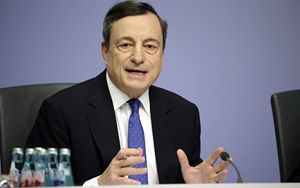(Finance) – “New rules and more shared sovereignty”. It is the recipe for the Eurozone of Mario Dragons. In an intervention in the Economist, the former Italian prime minister and former president of the ECB explained that “the strategies which in the past ensured Europe’s prosperity and security, relying on theAmerica for safety, at China for export and to Russia for energy, have become insufficient, uncertain or unacceptable”. As for the budget policiesaccording to Draghi “passively returning to the old rules suspended during the pandemic would be the worst possible outcome”.
“Europe is now faced with a series of challenges supranational which will require large amounts investments in a short time, including the defense, the green transition and the digitization“, he underlined, and at present “Europe does not have a federal strategy to finance them, nor can national policies assume the role, since European budgetary and state aid rules limit the ability of countries to act independently”. For Draghi, Europe runs the “serious risk” of not reaching its followers goals climatic and of failing “to guarantee the security required by its citizens”, losing “its own basis industrial to the advantage of regions that impose less constraints on themselves. For this reason, passively return to old tax rulessuspended during the pandemic, would be the worst possible outcome.”
According to the former ECB president, the best solution is to overcome them budget rules and on state aid which limit the ability of individual countries to act independently. This is not the case in America, Draghi recalls, “where the Biden administration is aligning federal spending and tax incentives with the pursuit of national goals”. But simply relaxing fiscal and state aid rules, allowing member states to shoulder the full brunt of the necessary investments, would be the wrong approach for Draghi. This is why it is necessary to redefine the framework of EU budgetary policies and decision-making processes.
We therefore need new rules that are strict, to guarantee credible state finances in the medium term, but also flexible enough, to allow governments to react to unexpected shocks. And then “transfer more spending power to the centre”. And with a view to further enlargements from the EU to the Balkans and atUkraine, Draghi invites us to “avoid repeating the mistakes of the past, expanding the periphery without strengthening the centre”. The risk – he argues – is to water down the EU rather than strengthen its ability to act”.
